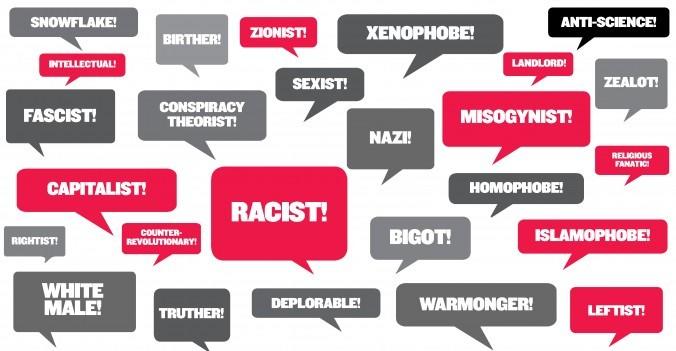
Basic Definition (from https://www.dictionary.com/browse/label)
a short word or phrase descriptive of a person, group, intellectual movement, etc
------------------------------------------------------------------------------------------------------------------
A label can be used in one of multiple ways (this might not be a full list but these are the common ways of using labels that I'm aware of):
1.Thoughtlessly (no clear concern about the reasonableness of it's use)
-Can be using multiple contradictory (but similar) labels to describe one object or person (example: communist liberals <--- 2 contradictory terms)
-That can easily be avoided by understanding what each term means in certain contexts (example: the fact the communist, socialist, and fascist have 3 distinct definitions)
-Can be using labels in an unwarranted and malicious way (example: "libtards", "commie thugs")
2. Disingenuously (in a way that entails clear intellectually malicious motives)
-Can be making claims about an entire political party or 'group' when it is misinformed, inaccurate or unsupported to do so. (example 'the left thinks x, the right thinks x, Demorcrats want x, Republicans want x)
-A more specific example: "Republicans (do/don't) make sense when it comes to economics." (inserting 'do' OR inserting 'don't' into the sentence)
-Another example: 'What? you agree with that guy? He's a (conservative/liberal)!'
3. Efficiently (for conversational efficiency) and Rationally (without an overgeneralized approach)
- (if it's implied that this refers to a normally functioning person) saying something like 'calculus is easy, if you can think about it in the right way' (which is a generalization about all of calculus but still can be reasonable in certain contexts where time for that conversation is limited enough).
4. Efficiently and Irrationally (with an unreasonable level of generalization with respect to the circumstances and the probable or known length of the conversation)
- (even with rather limited time this can still easily be unreasonable - example --->) 'Look, Jill, I have to go soon but I know the left is trying to put agenda 21 in place'
*They can also just not be used in some or all scenarios. (discluding things that have distinct purposes, for example Democrat and Republican - Political Parties)
As it turns out (while discluding the option with an astrick for a moment), only one of these options makes sense by it's nature.
--------------------------------------------------------------------------------------------------------------------------------------------
The basic argument for (essentially) minimizing the use of labels (other than in instances where all parties are aware that they are all using the same definitions and using the labels in a rational way):
(Premise 1) P1: Human beings, in using their intuitions, very often form associations between words, ideas, objects and sets of ideas.
P2 Labels are very often the subject of such associations. [Uses P1]
P3 Labels often describe groups and sets of ideas that have diverse ranges of variation in and of themselves.
(Conclusion 1 and Premise 4) C1 & P4 The basic intuitions of human beings very often ignore the scales of diversity in sets that are described in using labels in certain contexts (Liberal, Conservative, Left-leaning, Right-leaning, Philosopher, Public Intellectual, Author, Neuroscientist, Mathematician). [Uses P1, P2 and P3]
C2 & P5 Labels very often do not actually give justice to such ranges of variation in certain conversational contexts (example: 'Look we all know that all libertarians have under an x IQ' whatever x might be as long as it's relevant) [Uses P4]
C3 & P6 Human beings can use associations to draw vastly different conclusions about certain labels such that misunderstanding in conversations is inevitable eventually, given a frequent enough use of labels (on average). [Uses P5]
C4 & P7 Labels are only warranted when the risk of misunderstanding (when it exists) is outweighed. [Uses P6]
 Girl's Behavior
Girl's Behavior  Guy's Behavior
Guy's Behavior  Flirting
Flirting  Dating
Dating  Relationships
Relationships  Fashion & Beauty
Fashion & Beauty  Health & Fitness
Health & Fitness  Marriage & Weddings
Marriage & Weddings  Shopping & Gifts
Shopping & Gifts  Technology & Internet
Technology & Internet  Break Up & Divorce
Break Up & Divorce  Education & Career
Education & Career  Entertainment & Arts
Entertainment & Arts  Family & Friends
Family & Friends  Food & Beverage
Food & Beverage  Hobbies & Leisure
Hobbies & Leisure  Other
Other  Religion & Spirituality
Religion & Spirituality  Society & Politics
Society & Politics  Sports
Sports  Travel
Travel  Trending & News
Trending & News
What Girls & Guys Said
Opinion
1Opinion
Hogwash!
1) Generalizations are how one understands the world around them.
2) By definition, generalization does not mean everyone.
3) Generalizations are only untrue if they are inaccurate or if you apply the generalization to an individual.
(To @John_Doesnt - I am curious to know if I what I said you believe to be true? Please let me know, if you care to share.)
I never said that generalizations are inaccurate by their very nature. I said persons can overgeneralize (which can cause misunderstandings). and even THE VERY TITLE implies that they can be used in my own wording "practically".
Please put some thought into your comment before saying something that makes absolutely no sense, thank you.
This was too complicated for my mighty brain.